
TALANTA
Scope & Guideline
Advancing the Frontiers of Analytical Chemistry
Introduction
Aims and Scopes
- Analytical Method Development:
Research on creating and optimizing new analytical techniques for the detection and quantification of various analytes in complex matrices. - Biosensors and Bioanalytical Techniques:
Studies focused on the design and application of biosensors, including electrochemical, optical, and mass spectrometric methods for detecting biological markers. - Nanotechnology in Sensing:
Utilization of nanomaterials and nanostructures to enhance the sensitivity and selectivity of sensors for environmental and clinical applications. - Environmental Monitoring:
Research dedicated to the detection and analysis of pollutants, toxins, and other hazardous substances in environmental samples. - Food Safety and Quality Control:
Development of methods for the detection of contaminants, preservatives, and nutritional components in food products. - Biomedical Applications:
Application of analytical techniques in the diagnosis and monitoring of diseases, including cancer biomarkers and infectious diseases. - Material Science Innovations:
Research on new materials, such as metal-organic frameworks and conductive polymers, and their applications in sensor technology.
Trending and Emerging
- CRISPR/Cas-Based Detection Techniques:
There is a growing trend towards using CRISPR/Cas technology for sensitive and specific detection of nucleic acids and proteins, showcasing its potential in diagnostics. - Portable and Point-of-Care Biosensing:
Research on portable biosensing devices that allow for on-site testing and real-time monitoring of health markers has gained momentum, particularly in response to the COVID-19 pandemic. - Nanomaterial-Enhanced Sensing:
The integration of nanomaterials, such as metal-organic frameworks and carbon dots, into sensing platforms has become a prominent theme, enhancing sensitivity and selectivity. - Machine Learning and AI in Analytical Chemistry:
The application of machine learning and artificial intelligence for data analysis, pattern recognition, and predictive modeling in analytical methods is rapidly gaining traction. - Sustainable Analytical Practices:
Research focusing on green chemistry approaches, such as the use of deep eutectic solvents and environmentally friendly extraction methods, is increasingly prevalent. - Multi-Modal Detection Systems:
The development of sensors that combine multiple detection modalities (e.g., electrochemical, optical, and mass spectrometric) for comprehensive analysis is on the rise. - Microfluidic Technologies:
Innovations in microfluidic devices for high-throughput analysis and rapid diagnostics are becoming a significant area of research, enhancing the efficiency of sample processing.
Declining or Waning
- Traditional Chromatography Techniques:
There has been a noticeable decrease in the publication of studies focused solely on traditional chromatography methods, as newer, more innovative techniques gain traction. - Basic Spectroscopic Techniques:
Research articles that primarily discuss conventional spectroscopic methods without significant advancements or novel applications are becoming less frequent. - Generalized Sensor Technologies:
Publications that do not incorporate novel materials or unique methodologies in sensor development are declining, as the field moves towards more specialized and sophisticated approaches. - Single-Use Analytical Devices:
The focus on simple, single-use devices for analysis is waning as there is a growing interest in more sustainable, reusable, and multifunctional analytical platforms. - General Environmental Analysis:
Research that does not specifically address emerging contaminants or novel detection methods in environmental monitoring is becoming less common.
Similar Journals

Brazilian Journal of Analytical Chemistry
Bridging Gaps in South American Analytical ScienceBrazilian Journal of Analytical Chemistry, published by VISAO FOKKA COMMUNICATION AGENCY, serves as a vital platform for those engaged in the field of analytical chemistry, especially within the Latin American context. With an ISSN of 2179-3425 and an E-ISSN of 2179-3433, this journal aims to promote high-quality research and advancements in analytical methodologies, instrumentation, and applications spanning from 2010 to the present. Although it currently holds a Q4 rank in Analytical Chemistry by Scopus and is placed at the 24th percentile, its commitment to open access publishing provides invaluable opportunities for widespread dissemination of knowledge, catering to researchers, professionals, and students alike. The journal's editorial board comprises emerging and established experts aiming to bridge gaps in analytical chemistry research, particularly in a Brazilian and broader South American context. Situated in São Paulo, Brazil, the journal's role in fostering innovation and collaboration in analytical techniques makes it an essential resource for the academic community.
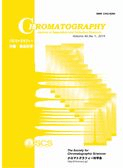
Chromatography
Transforming sample analysis with cutting-edge chromatographic research.Chromatography is an esteemed journal published by the SOC CHROMATOGRAPHIC SCIENCES, dedicated to advancing the field of chromatographic techniques and their applications across various disciplines, including analytical chemistry, biochemistry, and environmental science. By facilitating the exchange of high-quality research, Chromatography plays a pivotal role in enhancing methodologies and technologies that drive innovation in sample analysis. While the journal is not currently open access, it maintains a rigorous peer-review process, ensuring the publication of valuable and impactful studies. Researchers, professionals, and students alike can benefit from its comprehensive coverage of chromatography-related advancements, making it a vital resource for anyone engaged in this dynamic area of study.
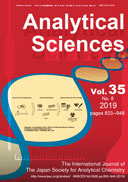
ANALYTICAL SCIENCES
Pioneering Research in Analytical SciencesANALYTICAL SCIENCES, published by SPRINGERNATURE, is a prestigious journal established in 1985 dedicated to advancing the field of analytical chemistry. With an ISSN of 0910-6340 and an E-ISSN of 1348-2246, this journal plays a critical role in disseminating high-quality research and innovative methodologies. Operating from Switzerland, it aims to provide a platform for scholars, researchers, and professionals to explore significant developments and applications in analytical techniques. Although classified in the third quartile (Q3) of analytical chemistry, which places it in a competitive framework (Rank #96/156, 38th Percentile in Scopus), its impact on the discipline is noteworthy. While it is not currently an open-access journal, the resources within are invaluable for those seeking to stay at the forefront of research and practice in analytical sciences, making it an essential read for anyone involved in this dynamic field. The journal continues to converge critical insights from 1985 to 2024, fostering a community dedicated to innovation and excellence in analytical chemistry.
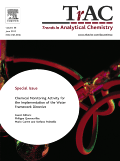
TRAC-TRENDS IN ANALYTICAL CHEMISTRY
Fostering Cross-Disciplinary Dialogue in Analytical ScienceTRAC - Trends in Analytical Chemistry is a prestigious journal published by Elsevier Science Ltd, situated in the Netherlands. With an impressive impact factor reflected in its Q1 rankings across three major categories—Analytical Chemistry, Environmental Chemistry, and Spectroscopy—this journal stands at the forefront of disseminating pioneering research and advancements in the field of analytical chemistry. Established in 1981, TRAC provides a comprehensive platform for researchers to share influential studies and insights related to the latest trends, methodologies, and technologies in analytical techniques. Recognized globally, the journal excels in fostering cross-disciplinary dialogue and innovation, making it an indispensable resource for academics, professionals, and students alike. Explore the latest issues to stay abreast of cutting-edge developments that shape the analytical sciences.

MICROCHEMICAL JOURNAL
Exploring the Depths of Microchemical TechniquesMicrochemical Journal, published by Elsevier, stands as a leading scholarly publication in the fields of Analytical Chemistry and Spectroscopy, boasting impressive rankings of Q1 and Q2 in their respective categories for 2023. With an H-index reflecting its substantial impact and relevance, this journal has been a cornerstone of research dissemination since its inception in 1957, and it continues to play a vital role in advancing the methodological and technological innovations within these disciplines. The journal presents peer-reviewed articles that explore a wide array of topics, making it an essential resource for researchers, professionals, and students keen on the latest advancements in microchemical processes and techniques. Although it does not currently offer open access options, its publication through Elsevier ensures a high standard of academic integrity and wide accessibility through various academic institutions. With a strong Scopus ranking—9th in Chemistry Spectroscopy and 22nd in Analytical Chemistry—Microchemical Journal is an indispensable platform for empirical studies, insightful reviews, and pioneering methodologies in the microchemical domain.

JOURNAL OF ANALYTICAL CHEMISTRY
Shaping the Future of Analytical PracticesJOURNAL OF ANALYTICAL CHEMISTRY, published by PLEIADES PUBLISHING INC, stands as a pivotal resource in the field of analytical chemistry, offering an innovative platform for researchers, professionals, and students to advance their knowledge and contribute to the discourse within the discipline. With an ISSN of 1061-9348 and an E-ISSN of 1608-3199, this journal features a focused exploration of analytical methodologies, instrumentation developments, and applications across various domains, contributing to practical and theoretical advancements in the field. Currently ranked in the Q3 category in Analytical Chemistry with a Scopus rank of #111 out of 156, it provides critical insights and innovation strategies for professionals aiming to enhance their analytical capabilities. Access to the journal is through standard subscription models, and it covers an extensive range of topics pertinent to the discipline from 1996 to 2024. Engage with the JOURNAL OF ANALYTICAL CHEMISTRY to be part of a vibrant research community dedicated to push the boundaries of analytical practices.
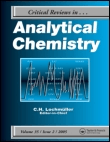
CRITICAL REVIEWS IN ANALYTICAL CHEMISTRY
Innovating Insights for Tomorrow's Analytical Challenges.Critical Reviews in Analytical Chemistry, published by Taylor & Francis Inc, stands as a pivotal journal in the field of analytical chemistry, contributing significantly to its advancement since its inception in 1989. With an impressive Q1 ranking in the 2023 analytical chemistry category, it positions itself among the top 15 journals in the field, reflecting its high impact and relevance, as evidenced by a 90th percentile Scopus rank. This esteemed journal is dedicated to publishing comprehensive reviews that synthesize current research and emerging methods in analytical techniques, making it an invaluable resource for researchers, professionals, and students alike. With the goal of fostering innovation and collaboration, Critical Reviews in Analytical Chemistry continues to address challenges and breakthroughs within the sphere of analytical methodologies, ensuring its authors and readers remain at the forefront of scientific discovery.

Separation Science Plus
Connecting scholars to the forefront of separation innovation.Separation Science Plus is an emerging academic journal dedicated to advancing the field of analytical chemistry and separation science. Published by WILEY-VCH Verlag GmbH, this journal provides a platform for researchers to disseminate high-quality studies and reviews that address innovative techniques and breakthroughs in separation methodologies. With its ISSN 2573-1815, the journal has made significant inroads since its inception in 2018, encompassing a convergence period until 2024. Despite currently holding a Q3 ranking in Analytical Chemistry and a Q4 ranking in Filtration and Separation, its dedication to publishing impactful research makes it a vital resource for professionals and students alike. The journal operates under the robust scholarly reputation of WILEY, which is known for its commitment to excellence in scientific communication. Researchers interested in the latest advancements in separation techniques will find Separation Science Plus an essential read, fostering the exchange of knowledge and facilitating greater understanding within this specialized field.
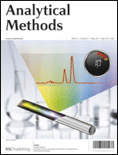
Analytical Methods
Pioneering Research in Analytical TechniquesAnalytical Methods, published by the renowned Royal Society of Chemistry, is a distinguished journal that has been serving the scientific community since its inception in 2009. Specializing in the fields of Analytical Chemistry, Chemical Engineering, and General Engineering, this journal holds a reputable position with an impressive Q2 ranking in three relevant categories as of 2023. With its focus on innovative methodologies and advanced applications in analytical science, it aims to disseminate cutting-edge research and foster dialogue among researchers, professionals, and students. Although it is not an open access publication, it is accessible worldwide and provides critical insights into the latest developments in analytical techniques and their engineering applications. The journal also ranks highly in pertinent Scopus categories, such as being in the 77th percentile for General Engineering and 61st percentile for Analytical Chemistry, underlining its significance in advancing knowledge and practical applications in these fields. By participating in this journal, readers can expect to engage with high-quality research that influences the future of analytical practices and chemical engineering.

Biosensors-Basel
Connecting disciplines to drive biosensor excellence.Biosensors-Basel is a premier Open Access journal, published by MDPI since 2011, dedicated to advancing the field of biosensors and related technologies. With its academic headquarters in Basel, Switzerland, the journal serves as a vital resource for researchers, professionals, and students across various disciplines, including Analytical Chemistry, Biomedical Engineering, Biotechnology, and Clinical Biochemistry. Boasting an impressive range of quartile rankings—such as Q1 in Instrumentation and Q2 across several other categories—Biosensors-Basel is recognized for its high-impact research and significant contributions to the scientific community, evidenced by Scopus rankings that place it among the top journals in its field. The journal's open-access model ensures that cutting-edge findings are accessible to a global audience, promoting collaboration and innovation in biosensor technology and its applications. Scholars and professionals looking to stay on the forefront of this dynamic field will find Biosensors-Basel an indispensable platform for sharing knowledge and fostering advancements.